Macduff may refer to:
Macduff may refer to:
Cináed mac Duib, anglicised as Kenneth III, and nicknamed An Donn, was King of Alba (Scotland) from 997 to 1005. He was the son of Dub. Many of the Scots sources refer to him as Giric son of Kenneth son of Dub, which is taken to be an error. An alternate explanation is that Kenneth had a son, Giric, who ruled jointly with his father.

Alastair Arthur Windsor, 2nd Duke of Connaught and Strathearn was a member of the British Royal Family. He was the only child of Prince Arthur of Connaught and Princess Alexandra, 2nd Duchess of Fife. He was a great-grandson of Queen Victoria through his father and a great-great-grandson of Queen Victoria through his mother. He was also a descendant of Victoria's paternal uncle and predecessor, William IV, through an illegitimate line.

Duke of Fife is a title in the Peerage of the United Kingdom that has been created twice, in both cases for Alexander Duff, 1st Earl of Fife. In 1889, Lord Fife married Princess Louise, the eldest daughter of Albert Edward, Prince of Wales and a granddaughter of Queen Victoria.

Lord Macduff, the Thane of Fife, is a character and the main antagonist in William Shakespeare's Macbeth (c.1603–1607) that is loosely based on history. Macduff, a legendary hero, plays a pivotal role in the play: he suspects Macbeth of regicide and eventually kills Macbeth in the final act. He can be seen as the avenging hero who helps save Scotland from Macbeth's tyranny in the play.
Fife is a council area and historic county in Scotland.
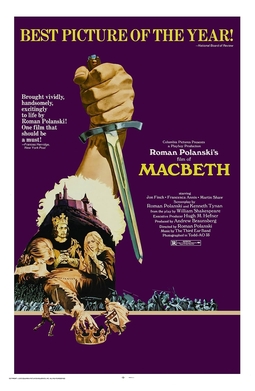
Macbeth is a 1971 historical drama film directed by Roman Polanski, and co-written by Polanski and Kenneth Tynan. A film adaptation of William Shakespeare's tragedy of the same name, it tells the story of the Highland lord who becomes King of Scotland through treachery and murder. Jon Finch and Francesca Annis star as the title character and his wife, noted for their relative youth as actors. Themes of historic recurrence, greater pessimism and internal ugliness in physically beautiful characters are added to Shakespeare's story of moral decline, which is presented in a more realistic style.
The Earl of Fife or Mormaer of Fife was the ruler of the province of Fife in medieval Scotland, which encompassed the modern counties of Fife and Kinross. Due to their royal ancestry, the earls of Fife were the highest ranking nobles in the realm, and had the right to crown the king of Scots.
Malcolm, Malcom, Máel Coluim, or Maol Choluim may refer to:
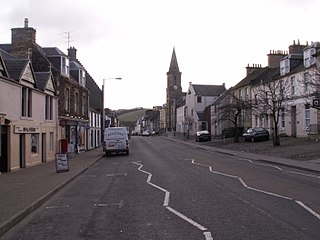
Newburgh is a royal burgh and parish in Fife, Scotland, at the south shore of the Firth of Tay. The town has a population of 2,171, which constitutes a 10% increase since 1901 when the population was counted at 1,904 persons.
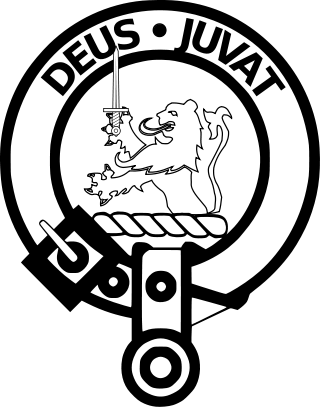
Clan MacDuff or Clan Duff is a Lowland Scottish clan. The clan does not currently have a chief and is therefore considered an armigerous clan, which is registered with the Lyon Court. The early chiefs of Clan MacDuff were the original Earls of Fife, although this title went to the Stewarts of Albany in the late fourteenth century. The title returned to the MacDuff chief when William Duff was made Earl Fife in 1759. His descendant Alexander Duff was made Duke of Fife in 1889.
Fleance is a figure in legendary Scottish history. He was depicted by 16th-century historians as the son of Lord Banquo, Thane of Lochaber, and the ancestor of the kings of the House of Stuart. Fleance is best known as a character in William Shakespeare's play Macbeth, in which the Three Witches prophesy that Banquo's descendants shall be kings. Some screen adaptations of the story expand on Fleance's role by showing his return to the kingdom after Macbeth's death.

Isabella MacDuff, Countess of Buchan, was a significant figure in the Wars of Scottish Independence.
Wemyss can refer to:
The surname Duff has several origins. In some cases, it is an Anglicised form of the Gaelic Ó Duibh, Mac Giolla Duibh, Mac Duibh. The surname Duff is also sometimes a short form of Duffin, and MacElduff, and Duffy.

Macduff is a town in the Banff and Buchan area of Aberdeenshire, Scotland. It is situated on Banff Bay and faces the town of Banff across the estuary of the River Deveron. Macduff is a former burgh and was the last place in the United Kingdom where deep-water wooden fishing boats were built.
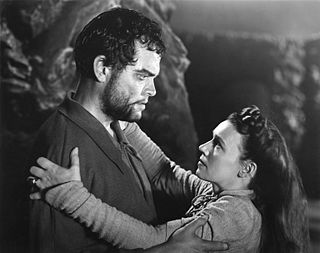
Lord Macbeth, the Thane of Glamis and quickly the Thane of Cawdor, is the title character and main protagonist in William Shakespeare's Macbeth. The character is loosely based on the historical king Macbeth of Scotland and is derived largely from the account in Holinshed's Chronicles (1577), a compilation of British history.
McDuff is a surname. It is the Anglicized form of the Scottish Gaelic name Mac Dhuibh. Notable people with the surname include:

MacDuff's Castle is a ruined castle near East Wemyss, in Fife, Scotland. The site is associated with the MacDuff Earls of Fife, the most powerful family in Fife in the middle ages, although nothing survives from this period. The present ruins are the remains of the home of the Wemyss family, who lived here from the 14th century, and their successors in the 16th century.
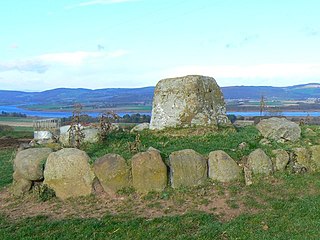
MacDuff's Cross, also known as the Cross of MacDuff or Ninewells, is the remains of an ancient white sandstone monument, located on a historic site between Lindores and Newburgh in Fife, Scotland. Robert Sibbald suggested the date of its construction to have been 1059 CE, however earlier dates have been considered.

The Feudal Barony of MacDuff is a Scottish Feudal Barony in Macduff, Scotland, contained mostly within the boundaries of the Town of Macduff, in the Banff and Buchan area of Aberdeenshire, Scotland. Clan MacDuff traces origins to the historic, Lowland, Scottish Duff Clan. William Shakespeare's MacBeth has always played a role in the legend of Clan MacDuff, as few can determine the line between The Duff Family history and historical fiction. This ambiguity worked to the benefit of future MacDuff Barons, who were able to prove they were descended from the first Duff to receive a charter in Northeast Scotland. In 1404 David Duff received the charter, in Aberdeenshire, from Robert III of Scotland. In 1759, William Duff was granted the historic Celtic Title of “Fife”, further tying the Duffs of Northeast Scotland, with their ancient Lowland ancestors - the original Earls of Fife from the 11th century. William Duff had five sons - the eldest, James, would become the 2nd Earl Fife and the 1st Baron of MacDuff. James invested heavily in the village of Doune, or “Down”, across the River Deveron from Banff. He built a harbor there in 1760, which quickly became more successful than the harbor at neighboring Banff, which had been established much earlier. In 1783 a charter was granted by King George III, changing the name from Doune to Macduff in his favor and, although a lesser title than Earl, bestowing on him the dignity of the 1st Baron of Macduff.